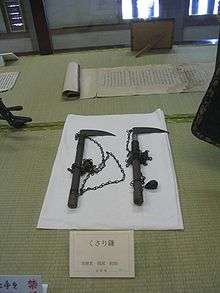Kusarigama
The kusarigama (Japanese: 鎖鎌, lit. "chain-sickle") is a traditional Japanese weapon that consists of a kama (the Japanese equivalent of a sickle) on a kusari-fundo – a type of metal chain (kusari) with a heavy iron weight (fundo) at the end. The kusarigama is said to have developed during the Muromachi period.[1] The art of handling the kusarigama is called kusarigamajutsu.

Methods of use
Attacking with the weapon usually entailed swinging the weighted chain in a large circle over one's head, and then whipping it forward to entangle an opponent's spear, sword, or other weapon, or immobilizing his arms or legs. This allows the kusarigama user to easily rush forward and strike with the sickle. Also, the weapon is said to have the highest mortality rate of any and all weapons of its time.[2]
A kusarigama wielder might also strike with the spinning weighted end of the chain directly while still outside the range of an opponent's hand weapon.
Legality
In the Republic of Ireland, the kusari gama is classified as an illegal offensive weapon.[3][4]
In Canada, under the Criminal Code of Canada's centrifugal force criteria, the kusarigama is a prohibited weapon due to the chain using said force. A kama (the correct term for a single tool) is legal.
See also
- Chain weapon
- Chigiriki
- Grappling hook
- Kusari-fundo
- Kusarigamajutsu, the art of handling the kusarigama
- Kyoketsu-shoge
- Okinawan kusarigama, Okinawan chain and sickle weapon
References
- Legacies of the sword: the Kashima-Shinryū and samurai martial culture Karl F. Friday, Fumitake Seki, University of Hawaii Press, 1997 P.122
- Secrets of the samurai: a survey of the martial arts of feudal Japan, Oscar Ratti, Adele Westbrook, Tuttle Publishing, 1991 P.317
- http://www.justice.ie/en/JELR/Pages/FAQ
- http://www.irishstatutebook.ie/eli/1991/si/66/made/en/print
Sources
- Oscar Ratti and Adele Westbrook, Secrets of the Samurai: The Martial Arts of Feudal Japan (1973)
- Ellis Amdur, Old School: Essays of Japanese Martial Traditions (2002)
| Wikimedia Commons has media related to Kusarigama. |